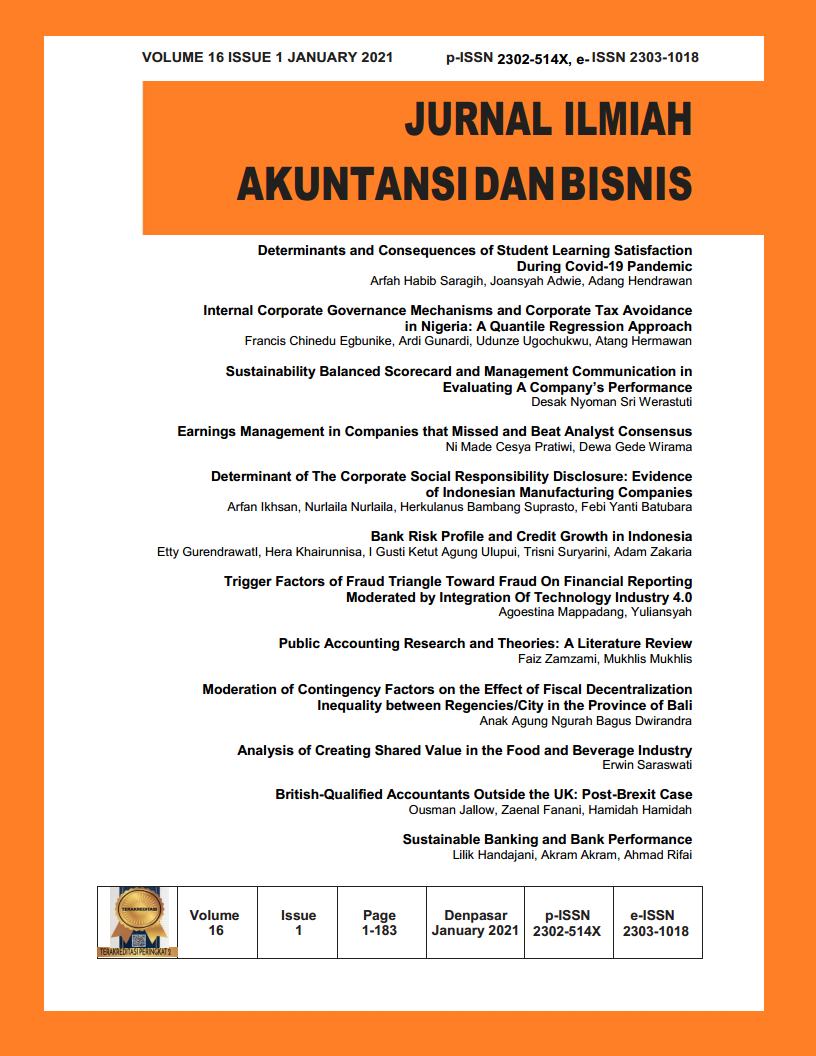Moderation of Contingency Factors on the Effect of Fiscal Decentralization Inequality between Regencies/Cities in the Province of Bali
Abstract
Fiscal decentralization affects inequality between regions but is not always linear because of contingent factors. The purpose of this study is to confirm the effect of fiscal decentralization on inequality between regions in the Bali Province. Specifically, this research aims to examine the moderating effect of contingent factors, such as regional spending, private investment, and general allocation funds, on fiscal decentralization. Secondary data published on the local government/municipal government website and Bali provincial statistics agency were used. Data were analyzed using moderated regression analysis techniques. Results conclude that fiscal decentralization has no significant negative effect on inequality between regions. Both regional expenditures and general allocation funds are unable to moderate the negative effect of fiscal decentralization on inequality between regions. On the other hand, private investment moderates the negative effect of fiscal decentralization on inequality between regions.
Keywords: fiscal decentralization, inequality between regions/cities, regional spending, private investment, general allocation funds.
Downloads
References
Aswandi, H., & Kuncoro, M. (2002). Evaluation of Mainstay Designation: Empirical Study in South Kalimantan 1993-1999. Indonesian Journal of Economics and Business, 17(1), 27–45.
Bonet, J. (2006). Fiscal decentralization and regional income disparities : evidence from the Colombian experience. 676, 661–676. https://doi.org/10.1007/s00168-006-0060-z
CNN indonesia. (2018, August). The concept of “One Island Management” will be applied to Bali. CNN Indonesia.
Ebel, R. D., & Yilmaz, S. (2002). Concept of Fiscal Decentralization and World Wide Overview.
Ghozali, I. (2018). Multivariate Analysis Application with IBM SPSS 25 Program. Diponegoro University Publishing Agency.
Harianto, & Hadi, A. P. (2006). Relationship between DAU, Capital Expenditure, PAD, and Income Per Capita. Accounting National Symposium IX.
Hayek, F. (1945). The Use of Knowledge in Society. American Economic Review, 35, 519–530.
Ismerdekaningsih, H., & Rahayu, E. S. (2002). Analysis of the Relationship between Tax Revenues and Gross Domestic Product in Indonesia (1985-2000 Study).
Kuncoro, M. (2004). Autonomy and Regional Development: Reform, Planning, Strategy and Opportunities. Erlangga.
Kundhani, E. Y. (2015). Analysis of The Effect of Fiscal Decentralization on Economic Disparities Between Regions (Case Study of Districts/Cities in Central Java Province). Kristen Satya Wacana University.
Kuznets, S. (2019). Economic growth and income inequality. In The Gap Between Rich and Poor: Contending Perspectives On The Political Economy of Development. https://doi.org/10.4324/9780429311208-4
Lin, J. Y., & Liu, Z. (2000). Fiscal decentralization and economic growth in China. Economic Development and Cultural Change, 49(1).
Mangkoesoebroto, G. (2001). Public Economics Edition – III. BPPE.
Muluk, K. M. R. (2007). Challenging Public Participation in Local Government (In a Study With a Systems Thinking Approach) (Edition I). Bayumedia Publishing.
Murray, D. (1990). The Performance Effect of Participative Budgeting: An Integration of Intervening and Moderating Variables. Behaviour Research in Accounting, 2, 102–121.
Musgrave, R. (1959). Theory of Public Finance: A Study in Public Economy. McGraw.
Nurhuda, R., Muluk, M. R. K., & Prasetyo, W. Y. (2013). Analysis of Development Inequality (Study in East Java Province 2005-2011). Journal of Public Administration, 1(4), 110–119.
Oates, W. E. (1972). Fiscal Decentralization and Economic Development. National Tax Journal, 46.
Putri, N. P. V. S., & Natha, I. K. S. (2015). The Influence of Local Own Revenue, General Revenue Allocation Fund. E-Journal of EP Udayana University, 4(1), 41–49.
Rosdyana, D., & Suhendra, E. S. (2015). The Effect Of Fiscal Decentralization On Regional Economic Growth And Income Inequality In The Island Of Java 2009-2013. Proceedings PESAT (Psikologi, Ekonomi, Sastra, Arsitektur&Sipil), 123–132.
Samuelson, P. A., & Nordhaus, W. D. (1994). Economic Development (Translated edition) (Editioni k). Erlangga.
Sasana, H. (2009). Analysis of the Impact of Economic Growth, Inter-Regional Gaps and Absorbed Labor on Welfare in Districts/Cities in Central Java Province in the Era of Fiscal Decentralization. Journal of Business and Economics (JBE), 16(1), 50–72.
Siagian, A. R. (2010). The Impact of Fiscal Decentralization on Regional Economic Growth and Regional Inequality (A Case Study of West Java Province).
Sianturi, Y. S. (2011). The Impact of Fiscal Decentralization on Inter-Regional Income Inequality (District / City Case Study of North Sumatra Province).
Sjafrizal. (2012). Regional and Urban Economics. Raja Grafindo Persada.
Solimun. (2010). Analisis Multivariat Pemodelan Struktural Metode Partial Least Square- PLS. CV. Citra.
Sukirno, S. (2016). Macroeconomics: An Introductory Theory (Editioni 3). Rajawali Press.
Tadaro, M. P., & Smith, S. C. (2006). Economic Development in The Third World (Edition 2). Erlangga.
Tiebout, C. (1956). A Pure Theory of Local Expenditures. Journal of Political Economy, 64(5), 416–424.
V Govindarajan. (1986). Impact Of Participation In The Budgetary Process On Management Attitudes And Performance: Universalistic And Contigency Perspectives. Decision Sciences, 496–516.




















